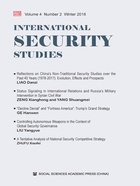
3 Academic Significance of NTSS and Its Influence on China’s Policies
The academic significance,which points to the relationship between theories,means that as academic explorations in theories and ideas,NTSS has exerted influence in both the subject itself and security studies in the broader sense; while the influence on policies,pointing towards the relationship between theories and reality,refers to the role of NTSS in security reality and policy-making as a provider of guidance,advice,assessment,judgment,and prediction.Progress in academic innovations may enhance the actions of governance,and open and inclusive governance inspires the more ambitious development of academic studies.
3.1 Academic Significance
In reviewing the academic achievements of Yu Xiaofeng and his team from Zhejiang University during ten years,Wang Yizhou stated that in terms of the number of research results,the extensiveness of genres,connotations,academic awareness and thinking innovations,NTSS in China has echoed the turn in security studies worldwide[70].
Compared with traditional security studies,NTSS in China has boosted the major shift in “security paradigm”.
First,NTSS in China has facilitated the shift in security epistemology,which used to base on materials,strengths,geopolitical materialism,scientism,and positivism.Now the mainstream (non-traditional) security studies are dominated by epistemological approach developed in idealism (which is concerned about ideas,cultures,relations and genders),historicism,humanism,and feminism,and the zero-sum or negative-sum mentality of gaining security at the expense of others has given way to a security concept that stresses interdependence,responsibility and a common future.
Second,NTSS in China has expanded the domain of security topics.Security studies have become open and inclusive,and cover all the “marginal” issues that used to be seen as irrelevant to military security but are regarded basic issues that matter to human subsistence and growth,and sustainable national and social development.
Third,NTSS in China has promoted the shift of methodology in security studies.Ideas of how to optimize security reality have gone through a fundamental change: the approach of power balance is weakened,while the relations between society,nature,science and technology and the analytical methods that emphasize relations,morality,identification,and intergenerational affairs have been more accepted; and descriptive,explanatory,empirical and summative methods have gradually been replaced by those that are analytical,standardized,constructive and the post-modern approach that “reset the rules” in the field.
Fourth,NTSS in China has established the “China Paradigm” in security studies.Unlike the Western paradigm that prioritizes attack and defense,confrontations,jurisprudence,contracts and mechanisms,Chinese NTSS presents a new one that highlights “peace”,“safe”,“cooperation” and consultative,relational,and coordinated approaches.Therefore,Yu Xiaofeng believes that NTSS in China has reshaped “security civilization”[71].
3.2 Influence on Policies
The status of NTSS in China echoes an ancient Chinese saying: articles are written to address the issues of the moment.It may be understood in two aspects:
On the one hand,articles on non-traditional security have delineated the historical path of the security reality and the evolution of security governance.These records have mirrored the changes in the study of non-traditional security: from sporadic cases to regular research,from a single subject to an interdisciplinary domain of topics,from a self-inflicted isolation to the integration with the world mainstream; they have also reflected the process of awareness growth and systematic construction in NTSS in China; moreover,they have showcased that NTSS has risen in importance in the policy-making process: it is no longer the marginal branch of study that only dealt with specific countermeasures; instead,it has come to the spotlight and voluntarily offer strategic solutions.It is fair to say that they have become important documents to trace the evolution of non-traditional security concept and national and even global security governance in the past 40 years.And through their studies of non-traditional security theories,Chinese scholars have also developed a diverse understanding and construction of the reality,thoughts and culture of China,contributing to the awareness building of Chinese problems and culture among the Chinese academia.
On the other hand,writings on NTSS have also promoted the reforms of security governance in China.NTSS tends to formulate forward-looking notions and ideas and represents a force to push for governance reforms.
First,NTSS has facilitated reforms in security governance by producing new propositions including “human security”,“cooperation security”,and “sustainable security”; notions of “peace”,“security”,and “benevolence”,which are legacies from Chinese philosophy,have become a new guidance in China’s domestic and foreign policies and even in global security governance,signifying China’s role in the construction and development of the global society.
Second,NTSS has broadened the security topics,bringing more issues into the framework of national security governance by categorizing them as non-traditional security related.At present,security issues have elevated to equal status with development,and non-traditional security has become an important part of “overall national security”.“Security and development” constitute the two fundamental issues in China’s national governance system.
Third,NTSS has driven the improvement of security methods.Hard models of security featured by “management and control”,“power”,“order”,and the “rule of man” are gradually transformed to soft ones characterized by “governance”,“rights”,“safety”,and the “rule of law”.Under these new models,more considerations are given to people’s right to subsistence and development,and the security policy-making is conducted in a scientific way under the rule of law to reflect the will of the people.In other words,the public is playing an increasing role in the governance of non-traditional security.Another important fact is that enthusiasm and reforms in non-traditional security have also directed government attention to matters related to equity,justice and the rule of law,converging non-traditional security governance with the domestic and international agenda of development,rights and equity.